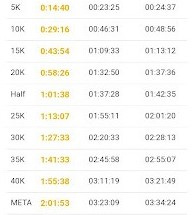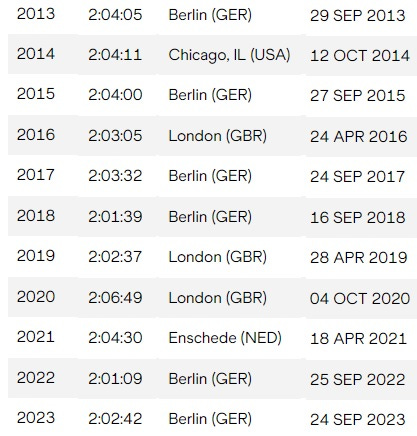The Chikiptum Marathon is upon us
A quick look at Kelvin Kiptum's chances of breaking the world marathon record and the stack heights of the men's and women's fields
The 2023 Chicago Marathon is nigh, with the elite men’s and women’s fields setting off together at 7:30 U.S. Central Daylight Time on Sunday morning. Wherever the hell you are, that’s fairly soon, assuming you were even able to view this post before the start of the race at all.
World Athletics published a preview of the races, Letsrun dedicated the entire week to Chicago Marathon coverage, and even Chicago NBC 5 has its own useful, if uncredited, write-up of the action to come. And you can watch the race live on the Chicago NBC 5 24/7 local news stream page.
Since it’s too close to race time for most readers to spend much time at the destinations of those links anyway, I’ll summarize the main story lines of the men’s and women’s races in one painful offset—Ruth Chepngetich is looking for her third straight Windy City win after a crash-and-burn 2:14:18 in 2022, with 2023 London Marathon winner Sifan Hassan expected to be her primary challenger, while Chicago debutante Kelvin Kiptum is gunning for the men’s world record of 2:01:09—so that I can move on to estimating Kiptum’s chances of breaking the world record.
Kiptum, 23, is a lanky Kenyan who appears to have been assembled mostly from bamboo shoots and has only two marathon finishes to his credit. But with an average time in those two races of 2:01:39—precisely the same time that cleaved 78 seconds from the world record when Eliud Kipchoge ran it in Berlin five autumns ago—it’s safe to say the man has potential. In fact, all cheekiness aside, despite his relatively spartan if potent resume, Kiptum was already a genuine teenage talent when Kipchoge recorded that 2:01:39 (which, to, be fair, came over a year after EK’s 2:00:25 at Nike’s Breaking2 Project, so the time didn’t surprise literally everyone). Kiptum ran a 1:02:01 half-marathon in Eldoret, Kenya at an altitude of close to 7,000 feet a couple of months before turning 18.
I wrote posts mentioning both of Kiptum’s marathon finishes, the first of these being a win at the 2022 Valencia Marathon last December and the second being a victory at the 2023 London Marathon in April. Below, I’ve reproduced the portions of those posts focusing on Kiptum’s splits.
Valencia 2022:
The splits from the app for surprise men’s winner Kelvin Kiptum are real, and boy, are they spectacular.
Splits of 1:01:38 and 1:00:15 are cartoonish on their own. But with the 28:05 10K late in the race (4:31 per mile; 1:58:30 marathon pace), they also require a laugh track.
This was Kiptum’s first finish of the year. Where has he been since dropping out of a race in January? Probably staying far away from other Kenyans to avoid contracting a positive test for triamcinolone, as well as getting more protein immediately after long runs, adding more naps, upping the length of his tempo runs, and embracing the joys of being a current or speculative family man (he’s only 23).
London 2023:
The London Marathon was this morning. The men’s race very sneakily produced a time 16 seconds slower than newly battered Eliud Kipchoge’s world record, while the women’s race saw an improbable five figures barrel into the chute 20 seconds apart in sub-2:19:00 times.
If you go to the race leaderboard, you can look at the status of the runners at each 5K split as well as halfway. If you do, you’ll discover that Kelvin Kiptum had four runners with him at 30K, with the group on pace to run 2:02:55. Kiptum then ran 27:50 between 30K and 40K, or 4:28.6 per mile. Between 40K and the finish, he slowed to 4:32.7 per mile.
Kiptum’s halves, in order, were 1:01:40 and 59:45, even though it was only in the second half of his second half that he really started motoring. This is someone who is clearly capable of running 2:00:30 in an official marathon with the right pacing, and gives him two sub-2:02:00 performances at the age of 23.
I’ll assume Kiptum is in exactly the same shape he was for London. In Valencia, his second half was 83 seconds faster than his first half, while in London he accelerated by 115 seconds. This as already astonishing at his level, but in both rases, his second half-marathons, taken alone, also featured significantly faster second halves. In other words, he was essentially accelerating from the halfway point on both times.
In April, I proposed that Kiptum could have run 2:00:30 in London. That still holds, but I’ll expand on the claim some while offering no solid evidence to support it.
If a runner goes 1:00:40/59:45 en route to a 2:01:25 marathon, he or she essentially has to be capable of back-to-back 1:00:20 half-marathons even in the most conservative scenario, which is with even pacing throughout both halves of the 2:01:25 and a single, snap acceleration from 4:42.2 per mile to 4:33.5 per mile at the 21.1K point. But we* already know that Kiptum’s pacing was considerably more erratic than that, so he’s got to be capable of at least 2:00:20. He might even be able to break two hours.
And if that sounds crazy, recall that Kipchoge has already run 42.195 kilometers in 1:59:40, even if this “marathon” required a significant but hard-to-estimate amount of help from “pacers” whose real job was to break the air in front of Kipchoge into less-aerodynamically-resistant burbles. And Kipchoge, though now regarded as a marathon god since the time he first tried the distance at the age of 28-ish, had to muddle around for a while in the 2:03:05-to-2:04:11 range before discovering the true extent of his mojo.
The weather for the race is expected to be ideal—mid- to high forties (American units), overcast, mild breezes at worst. I don’t think Kiptum will break two hours tomorrow, and I don’t think he’ll ran any faster than 2:00:40. But I do think he will break the world record, and 2:01:00.
(Social-share/thumbnail photo: Olympics.com/PA Wire)





